Petro is a masculine given name, a surname, and an Ancient Roman cognomen.
Contents
Petro may also refer to:
Petro is a masculine given name, a surname, and an Ancient Roman cognomen.
Petro may also refer to:
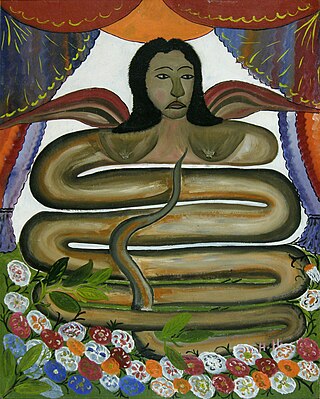
Lwa, also called loa or loi, are spirits in the African diasporic religion of Haitian Vodou. They have also been incorporated into some revivalist forms of Louisiana Voodoo. Many of the lwa derive their identities in part from deities venerated in the traditional religions of West Africa, especially those of the Fon and Yoruba.

Damballa, also spelled Damballah, Dambala, Dambalah, among other variations, is one of the most important of all loa, spirits in Haitian Voodoo and other African diaspora religious traditions such as Obeah. He is traditionally portrayed as a great white serpent, originating in the city of Wedo in modern-day Benin. Damballa is said to be the Sky Father and the primordial creator of all life, or the first thing created by Gran Met. In those Vodou societies that view Damballa as the primordial creator, he created the cosmos by using his 7,000 coils to form the stars and the planets in the heavens and to shape the hills and valleys on earth. In others, being the first thing created by God, creation was undertaken through him. By shedding the serpent skin, Damballa created all the waters on the earth. As a serpent, he moves between land and water, generating life, and through the earth, uniting the land with the waters below. Damballa is usually syncretized with either Saint Patrick or Moses. He is counted among the Rada loa.

Erzulie is a family of loa, or spirits, in Vodou.

Simbi are water spirits in traditional Kongo spirituality. In Haitian Vodoun context, they are a large and diverse family of serpents known as loa.
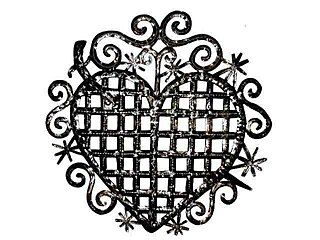
Ezilí Dantor or Erzulie Dantó is the main loa or senior spirit of the Petro family in Haitian Vodou. Ezili Danto, or Ezili Danto', is the "manifestation of Erzulie, the divinity of love,". It is said that Ezili Danto has a dark complexion and is maternal in nature. The Ezili are feminine spirits in Haitian vodou culture that personify womanhood. The Erzulie is a goddess, spirit, or loa of love in Haitian voudou. She has several manifestations or incarnations, but most prominent and well-known manifestations are Lasirenn, Erzulie Freda, and Erzulie Dantor. There are spelling variations of Erzulie, the other being Ezili. They are English interpretations of a Creole word, but do not differ in meaning.
Petro is a masculine given name, a surname and an Ancient Roman cognomen. It may refer to:
Haitian Vodou is a syncretic mixture of Roman Catholic rituals developed during the French colonial period, based on traditional African beliefs, with roots in Dahomey, Kongo and Yoruba traditions, and folkloric influence from the indigenous Taino peoples of Haiti. The lwa, or spirits with whom Vodou adherants work and practice, are not gods but servants of the Supreme Creator Bondye. In keeping with the French-Catholic influence of the faith, Vodou practioneers are for the most part monotheists, believing that the lwa are great and powerful forces in the world with whom humans interact and vice versa, resulting in a symbiotic relationship intended to bring both humans and the lwa back to Bondye. "Vodou is a religious practice, a faith that points toward an intimate knowledge of God, and offers its practitioners a means to come into communion with the Divine, through an ever evolving paradigm of dance, song and prayers."

Oungan is the term for a male priest in Haitian Vodou (a female priest is known as a. The term is derived from Gbe languages. The word hounnongan means chief priest. ‘'Hounnongan or oungans are also known as makandals.
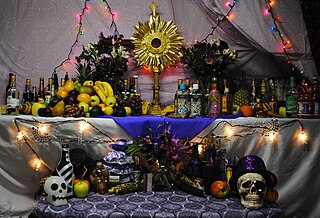
Homosexuality in Haitian Vodou is religiously acceptable and homosexuals are allowed to participate in all religious activities. However, in countries with large Vodou populations, some Christian influence may have given homosexuality a social stigma, at least on some levels of society.
The Petwo, also spelled Petro and alternatively known as dompete, are a family of lwa (loa) spirits in the religion of Haitian Vodou. They are regarded as being volatile and "hot", in this contrasting with the Rada lwa, which are regarded as sweet-tempered and "cool."
Rasin, also known as Haitian roots music, is a musical style that began in Haiti in the 1970s when musicians began combining elements of traditional Haitian Vodou ceremonial and folkloric music with various musical styles. The late 20th century style of this music links to the roots of Vodou tradition, where it came to be known as mizik rasin later in Haitian Creole. Modern-day, the movement is often referred to simply as "rasin" or "racine".
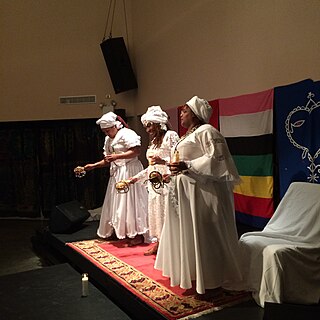
A manbo is a priestess in the Haitian Vodou religion. Haitian Vodou's conceptions of priesthood stem from the religious traditions of enslaved people from Dahomey, in what is today Benin. For instance, the term manbo derives from the Fon word nanbo. Like their West African counterparts, Haitian manbos are female leaders in Vodou temples who perform healing work and guide others during complex rituals. This form of female leadership is prevalent in urban centers such as Port-au-Prince. Typically, there is no hierarchy among manbos and oungans. These priestesses and priests serve as the heads of autonomous religious groups and exert their authority over the devotees or spiritual servants in their hounfo (temples).
Carrefour is a French word meaning road intersection.

Haitian Vodou is an African diasporic religion that developed in Haiti between the 16th and 19th centuries. It arose through a process of syncretism between several traditional religions of West and Central Africa and Roman Catholicism. There is no central authority in control of the religion and much diversity exists among practitioners, who are known as Vodouists, Vodouisants, or Serviteurs.
Loa are the spirits of Haitian Vodou and Louisiana Voodoo.
Vodou drumming and associated ceremonies are folk ritual faith system of henotheistic religion of Haitian Vodou originated and inextricable part of Haitian culture.
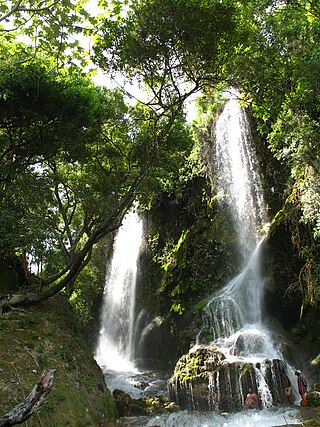
Saut-d'Eau is a commune in the Mirebalais Arrondissement, in the Centre department of Haiti. It has 34,885 inhabitants.
Chanel is a French fashion house.
Afro-Haitians or Black Haitians are Haitians who trace their full or partial ancestry to Sub-Saharan Africa. They form the largest racial group in Haiti and together with other Afro-Caribbean groups, the largest racial group in the region.

Dominican Vudú, or Dominican Voodoo, popularly known as Las 21 Divisiones, is a heavily Catholicized syncretic shamanistic religion of African-Caribbean origin which developed in the erstwhile Spanish colony of Santo Domingo on the island of Hispaniola.